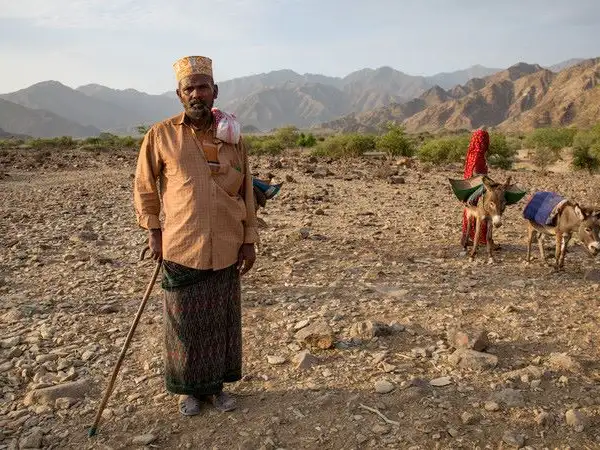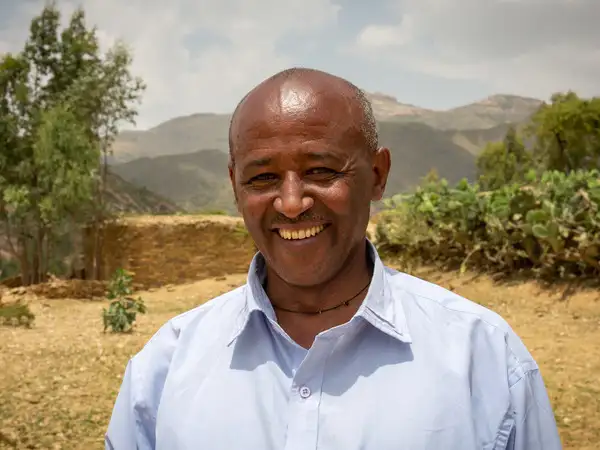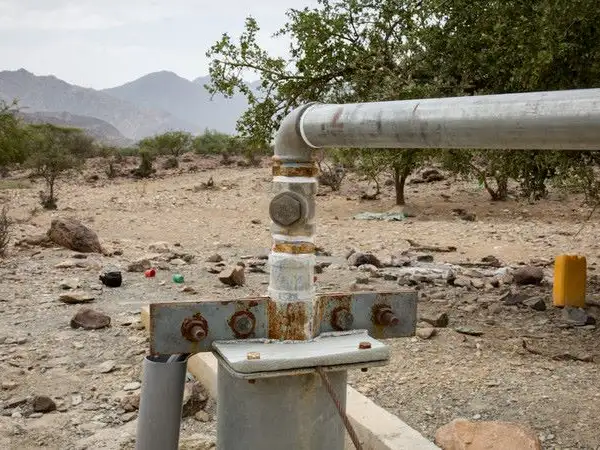

Ibrahim, 50, lives in what many consider to be the hottest place on earth.
Does he remembers when the pump was installed?
“Yes,” he nods, “I remember that day very well. It was a day filled with happiness.”
The pump has given the people in this out-of-reach community those lost days back. Now Ibrahim and his neighbours have the peace of mind that their community and way of life is secure, they are beginning to put plans into action to start farming and small business; plans that were dreamed up over decades on those long, devastating journeys.
“We would go out to get water at around 2am,” says 50-year-old Ibrahim, “and we would get back maybe 24 hours later.”
The searing heat beats down on the small group of neighbours here in the Danakil Depression in northern Ethiopia. The community lives in what many believe to be the hottest place on earth – before 8am the temperature is climbing past 41 degrees.
“We had no option but to make that journey every day,” he continues. “Our parents and grandparents did that too.”
Water scarcity is a global problem
We know one in three people around the world don’t have clean, safe water near their home, but the voices of people who live in communities like this one are heard less often. Living out of reach of cities, towns, hospitals and basic facilities, they are in danger of being forgotten.
“We used to collect water from a pool of water that was surrounded by cliffs. It was so difficult to get to. My wife and I would go there and I would have to get to the water by climbing a rope.
“We lived in hope that things would change. Every morning we would wake up and pray.”
It takes phenomenal willpower to keep your community and way of life alive in the face of this kind of challenge. Women, men, girls and boys all refusing to give in.
Why don't families move home to be nearer water?


Abebe Belachew, CAFOD’s climate change officer in Ethiopia.
This all-consuming problem is so complex, there is a danger of misunderstanding the situation by looking at it through our own lens. Abebe Belachew, CAFOD’s climate change officer in Ethiopia, explains some common misconceptions:
“I often hear the questions: why don’t the families here migrate? Why not move your home nearer to the water?” he says. “The idea being: 'if I want water, I just walk to a tap because there’s always one nearby. If there’s not a tap near, I just find the nearest one. It’s simple.'
"It’s not simple."
““If you move your home elsewhere, you need to go somewhere where there are friendly people. You can’t just strike out on your own like one of those intrepid explorers in history books."”
Abebe continues:
"People often live as close as they can to the water point. If their family and animals need water, they will then walk that distance, no matter how far it is.
"They stay because their community is their life. It’s where you get help if you’re sick. It’s where you ask someone to fetch water for you if you’re weak. If you need help – food, money or shelter – someone will help you. Your parents lived here, your grandparents did too, so did your great-grandparents. Your family tree is as much the place itself as it is the people.
“If you move your home elsewhere, you need to go somewhere where there are friendly people. You can’t just strike out on your own like one of those intrepid explorers in history books. Trust me, you can’t survive on your own no matter who you are. If you move to a new community, will those people accept you? How do you choose that new community? Who do you know there?
“Or say the community moves closer to the water point. There won’t be enough space for every family. Other sources might be next to another community and because they have very little anyway, they might not want to share.
“The idea that a water problem can be solved by moving nearer to the water misunderstands the complexity of life in places like the Danakil Depression.”
What is the solution?
Ibrahim shows us the solar-powered water pump that was installed near his home. He tells us that solar power means that anyone can collect water now from the pump – it doesn’t need someone to scale a cliff, or to use all their strength pushing a lever if the water level is low.


Water pours out of a life-saving pump in Ethiopia.

